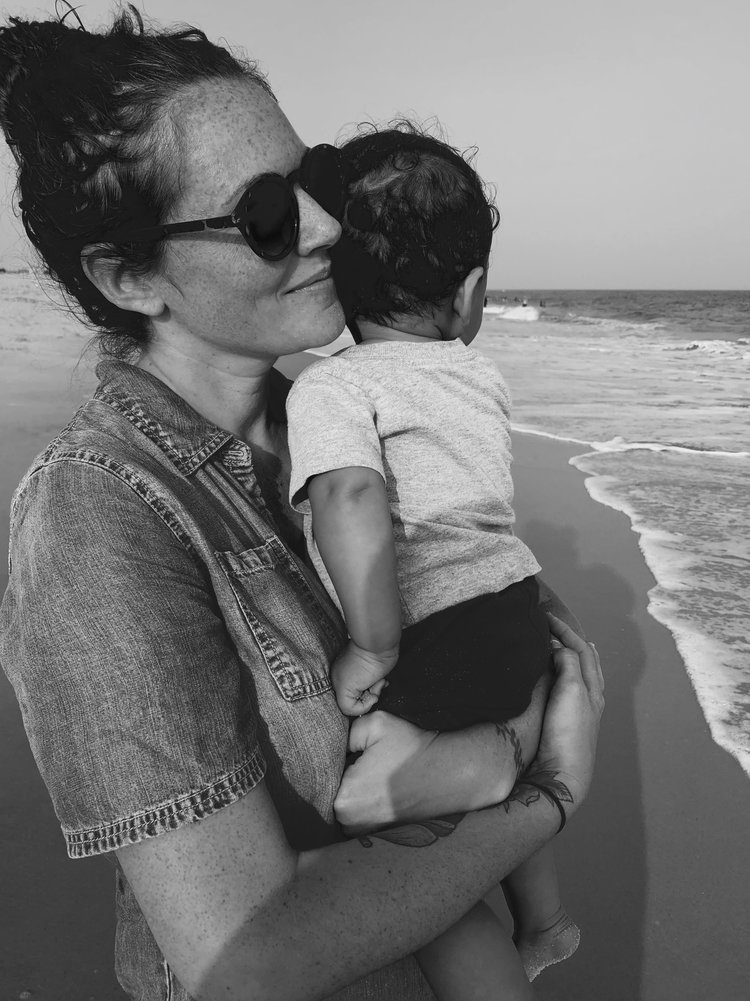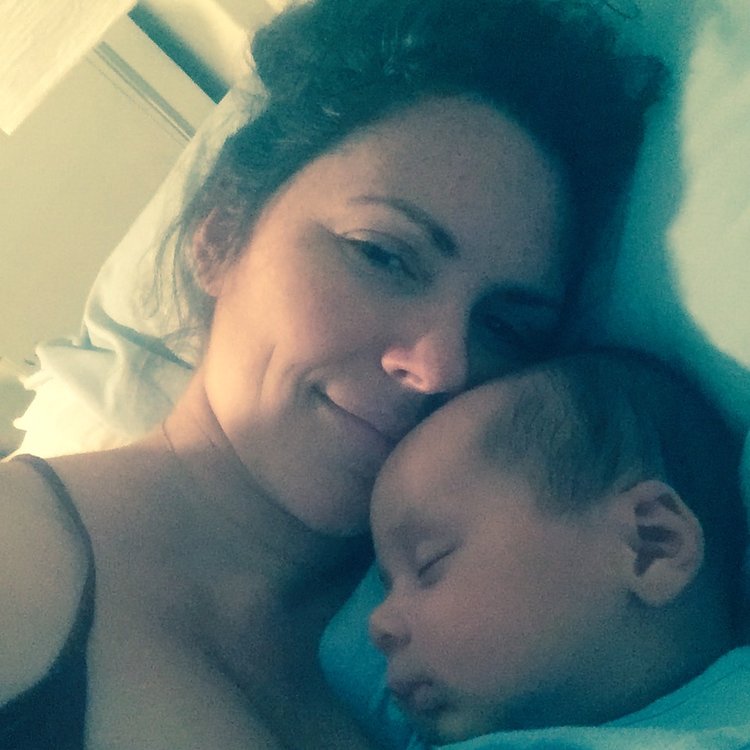A POWERFUL AND HONEST FIRST-HAND ACCOUNT OF A MOTHER’S JOURNEY NAVIGATING A DEBILITATING PMAD DURING HER PREGNANCY. THIS MAY BE DIFFICULT TO READ FOR WOMEN WHO ARE CURRENTLY EXPERIENCING PMAD SYMPTOMS.
I was not supposed to be a mother.
At 36, facing an uncertain future and struggling with a body ravaged by endometriosis, I very unexpectedly became pregnant.

My partner and I had been renovating the apartment attached to my childhood home. We’d gutted it in July, hoping to be finished by August. It was January and we were still working. I was nauseous—a symptom I’d grown accustomed to due to endo—and my period was two days late. I asked my partner to pick up a pregnancy test. Just in case. I’d taken tests before, knowing they’d be negative—a silent confirmation that my body was rotten.
But the test was positive. I was shocked. My partner dropped his spackling knife. I repeated “It’s wrong. It’s a mistake.” I took a second test. It was positive again. I stood in the doorway and he leaned back on the semi-installed cabinets. “I knew it,” he said. “When you came out of the bathroom.”
I’ve experienced life-altering realizations, shifts in perspective that I never believed possible, but this was such a radical change—destabilizing and frightening. Yet, it instantly filled me with a hope and usefulness that I’d never known.
What followed was a profoundly difficult nine months in which many things were tested: my relationship with my partner, my mental health, my desire to be a mother, my desire to live, and my ability to trust anyone—most vitally—myself.
I’d been on medication for anxiety and OCD for five years by this time. I decided to taper off for the “health of the baby,” a decision supported by my Ob/Gyn. For me, this turned out to be a mistake—one that nearly killed me and turned my pregnancy into an emotionally and psychologically grueling experience. There were moments of joy and wonder for which I am grateful—but the majority of my pregnancy was excruciating.
I felt claustrophobic and trapped, like I was suffocating. What about the moments I didn’t feel like being pregnant? It didn’t matter—I committed to bringing my son into the world, I had to learn to deal with my feelings. Only, my feelings were extreme. I was five and half months pregnant with untreated anxiety, panic, and OCD.
Without my prescribed medication, my emotional and psychological health deteriorated. I wept, sobbed, hiccupped. I wished I wasn’t pregnant. I wished I wasn’t alive. The cycling was exhausting: finding temporary peace—a few hours at a time if I was lucky—before I remembered my pain or fears or saw a bleak future of failure and loneliness. And brutal suicidal and homicidal ideations; violent atrocities on a loop that made me sicker and angrier with each return.
I felt desperate, terrified, and not connected to my baby.
Then I decided I needed to paint the outside of my mother’s house. I was obsessed. I could see it, concentrate on it, research for hours: the equipment: paint sprayers, sizes, quality; rent or buy? Home Depot or Lowes? How much did it weigh? Could I hoist it up a ladder? Should I get something smaller to hang on my shoulder? Or would that—over time—put more stress on my body? Were there hose lengths that would make it possible for me to stay on the ground? There were choices to make about paint color, brand, should I use a primer? Do I have the money for this? Did it matter?

When I felt guilty, my research would shift focus: What about the baby? Would the paint fumes hurt him? Us? Would the paint be toxic and soak through my pores and cause birth defects? This would direct me back to the depot site in search of the “best mask for paint fumes”. Endless google searches: pregnant women on ladders, pregnant house painters, best paint for pregnant women, worst paint for pregnant women, dangerous behavior, crazy, can unborn baby feel mothers: anxiety, fear, rage, hate, panic, and on and on.
At six months pregnant, over a manic two days, I painted until my mother pleaded from the bottom of the ladder for me to come inside.
Without medication, and compounded by the typical stresses of pregnancy, by month eight my OCD was consuming nearly any free moment of the day. It was progressive. What had been something like a tic or even an indulgence became compulsive. Google searches turned into videos of popping pimples, cysts, and abscesses; that graduated to botflies in humans, botflies in animals, manga worms in dogs, chiggers in human feet, compacted ear wax. Video after video of any kind of extraction keeping panic attacks from obliterating me.
I stopped going to work. I couldn’t ride the subway without fearing I’d be stabbed in the stomach, my unborn baby taken from my womb in a bloody heist on the 4 Train. I hadn’t slept in days and I could no longer eat. I entered a new and paralyzing phase of anxiety and distress.
For four straight days the panic came in waves—every couple of minutes a swell of tingling heat would roll up my back and over my shoulders—that pre-faint feeling. My stomach would drop and my breath shallowed. I wanted to throw up but couldn’t. I wanted to scratch deep and angry lines into my skin to make it stop. I wanted to close my eyes and be gone. I wanted some kind of relief. It didn’t come. Yet. All of this time—all of this panic—and still, my son was there, inside me.

Finally, unable to see an end to the panic attack, I made a series of desperate calls to my therapist, Ob/Gyn, and hospitals looking for help.
I was directed to The Motherhood Center. My partner and I went in for an emergency appointment and met with a reproductive psychiatrist. We explained my symptoms and she told us that the women she and the Center treat get better. It was the first moment in months that I could see a future with my baby. She explained the most recent research on medications and pregnancy and I learned that my extreme emotional, physical, and psychological distress might be more detrimental to my baby than any prescription I could take.
Under the doctor’s guidance, I went back on my meds and spent two weeks in their Day Treatment Program. I came to learn how deeply fearful I was of giving birth. How vulnerable and powerless I felt in my pregnant body. How utterly unimaginable motherhood seemed. Through group and individual therapy, I confronted these debilitating and life-threatening issues. At nine months pregnant, for the first time since going off medication, I accepted that I was going to be a mother.
A few weeks later, I met my son in the operating room while Otis Redding sang, “Amen”. My C-section was elective. The doctor agreed to have all women in the operating room, to let us play music, to hang a clear drape so I could see the moment my baby was lifted from my womb and, rather than tied down, she allowed my arms to be free. Perhaps it was the effect of the epidural, but the birth was matter-of-fact, neither particularly beautiful, nor distressingly gruesome. It seemed for the first time that things were as they should be—finally in their place.
Throughout my pregnancy I came to see how maternal mental health is largely ignored in this country, even in a place like New York. I was reminded that some medical advice is inaccurate, outdated, lazy, sexist, and flawed. I wonder how we women survive ourselves to grow and deliver healthy children with so little support for or acknowledgment of perinatal mood and anxiety disorders. At the Motherhood Center I learned how to advocate for myself, and I am most grateful to have learned to trust and depend on those I love and who love me.
Happy Mother’s Day to all the moms who have trudged a grueling road to bring their babies into the world and to those who trudge still to get back to themselves.
Sara Rempe is a writer and educator in New York. She earned her BA in creative writing and her MFA in poetry at Hunter College, where she received a teaching fellowship and a Norma Lubetsky Friedman Scholarship. She teaches at Hunter College and Fordham University. She writes and speaks about maternal mental health and perinatal mood and anxiety disorders and is a frequent collaborator with MomTown and The Motherhood Center of New York.


